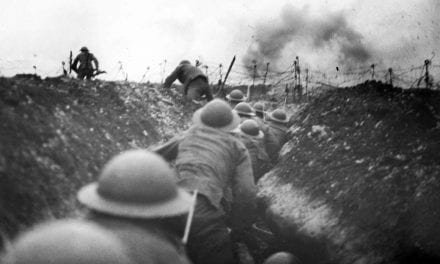We are very fortunate to be able to talk about war in theoretics. We are able to keep war at an antiseptic distance from ourselves, avoiding discussion of the “nasties” of conflict and, for the most part, live completely detached from the effects of war and conflict. War in New Zealand precedes any living memory, with no war fought on New Zealand soil since the 19th century. War is now something exclusive to far-away lands, separated from us by vast stretches of sea.
For this, we can be incredibly thankful. However, this detachment breeds an insouciance which makes us almost feel like modern war is a non-reality. Certainly, our daily lives are unaffected. This is not a distinctly New Zealand phenomenon either. The vast majority of western nations have no experience of war whatsoever and, as such, any knowledge of war can only be obtained through one of two sources: the media or research. Within our daily lives, we tend to rely on the former.
This leads me to my point of interest: the media presentation of war. War permeates various aspects of our media, but stories of modern conflict are most prevalent within traditional news media sources – television, newspapers and news websites. I argue that these mediums contribute significantly to our detachment from the events of the wider world. The presentation of war within news reporting is often side by side with stories of sports, celebrity relationships or economics. Perhaps, you may argue, that this is a symptom of the news bulletin. These subjects have to be presented simultaneously in order to convey the news to the transient attention of audiences. However, by doing so, events of war in some far-away land is somehow no side by side with a video of a cat – almost suggesting an equivalency of importance.
Sometimes violent events are given proper attention, with front line reporting and in-depth discussion. But when this happens there is a distinct undertone of racism. This type of attention will never be given to the 30 Iraqis killed market bombing, but will likely be offered if there are 3 French victims in an act of terror. Not only does this seem remarkably racist – in essence subtly inferring the value of western lives exceeds that of people outside our sphere – but in also creates a remarkable disassociation to events. When acts of violence are properly reported, it is only when it fractures the idealized vision of a peaceful world by endangering the lives of “first world” inhabitants. The media doesn’t present conflict to show it exists, but only when it becomes a threat to western lifestyle. A war limited to the Middle East or sub-Saharan Africa is never going to receive significant coverage. How often to we hear about wars in Somalia, Sudan or Yemen? Whereas wars with foreign intervention or ones that shatter the bubble of peace through acts of international terrorism will suddenly be thrust into the focus of the media.
Even when our attention is cast to foreign wars, it is only in terms of its impact upon the western way of life. We may hear about US troops being sent to Somalia, before we even realize there is a war there. Reporting may tell us of a terror attack in Pakistan, but only because an British Journalist is killed while reporting. Deaths are given the same treatment – a terror attack in Iraq killed 3 US soldiers, who will be named and duly honored, alongside twenty-something Iraqi schoolchildren.
The lives of 10, 20 or 100 people in the Central African Republic is never going to capture the interest of the media. Perhaps, this is because it doesn’t capture the interest of the population. While a Kardashian may only get married once a year, hundreds of people are killed in war every day. As such, it becomes the norm, not worth reporting on because nothing will change. It fails to capture the ephemeral interest of the media. Therefore, most people simply don’t know these events are even happening, much less the factors behind it. Was Iraq just a scapegoat used after 9/11 to further American economic interests? Is the war in Yemen fought with Western weapons, sold to Saudi Arabia for oil? Are there millions suffering under tyranny and war ever day, disregarded completely by those of us living in peace? Yet knowledge of this is absent from our lives and as such nothing is done to stop it.
lives of 10, 20 or 100 people in the Central African Republic is never going to capture the interest of the media. Perhaps, this is because it doesn’t capture the interest of the population. While a Kardashian may only get married once a year, hundreds of people are killed in war every day. As such, it becomes the norm, not worth reporting on because nothing will change. It fails to capture the ephemeral interest of the media. Therefore, most people simply don’t know these events are even happening, much less the factors behind it. Was Iraq just a scapegoat used after 9/11 to further American economic interests? Is the war in Yemen fought with Western weapons, sold to Saudi Arabia for oil? Are there millions suffering under tyranny and war ever day, disregarded completely by those of us living in peace? Yet knowledge of this is absent from our lives and as such nothing is done to stop it.
Warmongers and tyrants remain in power overseas and western governments continue to support them. Meanwhile, the population remains blissfully ignorant to these horrific truths. Truly helpless people are left to suffer and die every day, the least we can do is spare the time to care.









